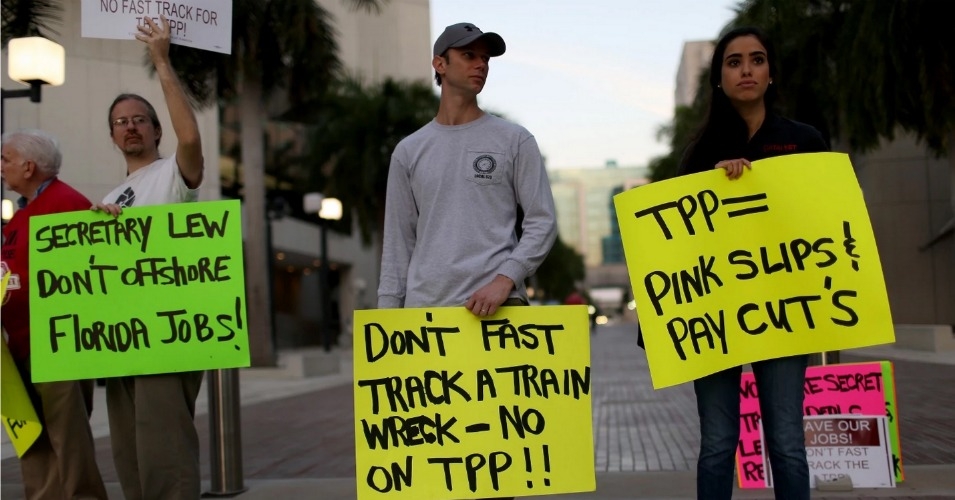Pact will not fundamentally alter nature of international trade

US State of Union members and community activists protest in Miami, where Treasury Secretary Jacob Lew was speaking on March 20.
Negotiations on the 12-party Trans-Pacific Partnership (TPP), after more than five years, were recently concluded. However, the controversies that have been stirred since the TPP was proposed still remain.
According to some academic publications, the TPP indicates the enduring importance that the US attaches to the Asia-Pacific region and its reluctance to end its dominant role.
When interviewed, many American scholars complain that most of the time, the TPP negotiation was conducted in an opaque fashion, completely obscuring the content of the agreement. The signing of such an agreement could become the political legacy of the Obama administration. Nevertheless, scholars also said that the TPP also requires the ratification of the US Congress, whereupon the agreement would face the dubious attitudes of the senators, which would make the finalization of the agreement uncertain.
Dwight Perkins, emeritus professor of political economy at Harvard University, noted that the TPP as it was originally designed and negotiated was primarily designed to establish rules for international trade in services and in particular to protect intellectual property rights. Most of those originally involved in its design were high-income countries and much of their trade today, particularly their exports, do not involve conventional commodities or low-technology manufacturers and the rules were particularly suited to problems high-income countries have found with the current rules or lack of rules.
The TPP will not fundamentally alter the nature of international trade today. Much of it will look much the same as before. But it will put new rules in place where the current rules are inappropriate or non-existent, Perkins added.
Scholars that have doubts about the agreement also published their ideas in recent days. Joseph Stiglitz, Nobel Prize winning economist, has always held a negative attitude toward the agreement. In an article co-authored with Adam Hersh, “The Trans-Pacific Free-Trade Charade,” Stiglitz wrote that we hear much about the importance of the TPP for “free trade,” but the reality is that this is an agreement to manage its members’ trade and investment relations—and to do so on behalf of each country’s most powerful business lobbies.
Paul Krugman, another Nobel Prize winning economist, wrote in the New York Times that almost everyone exaggerates the importance of trade policy. Comparative advantage is the basis for free-trade advocacy, but also suggests that once trade is already fairly open, the gains from opening it further are small. One particular misuse of the “pro-free-trade” sentiment is the persistent effort to make protectionism a cause of economic slumps, and trade liberalization a route to recovery. Leaked documents suggest that the US is trying to get radically enhanced protection for patents and copyrights. This is largely about Hollywood and the pharmaceutical industry rather than conventional exporters, Krugman wrote.
Some analysts say that some provisions of the agreement are set against China with insurmountable barriers. However, many experts say China’s economic growth has its own unique advantage. Arthur Kroeber, senior research fellow from the Brookings-Tsinghua Public Policy Centre, said that China’s economic strength comes from its sheer size, its continued growth—which though slower than in the past is still faster than that of most other Asian economies—and its increasing centrality in global supply chains. Moreover, China has its own strategy for increasing its influence, through initiatives under “the Belt and Road” umbrella, which will be funded by the China-led Asian Infrastructure Investment Bank (AIIB). The impact of “the Belt and Road” initiative will likely be felt more immediately and concretely than the effect of the TPP.
